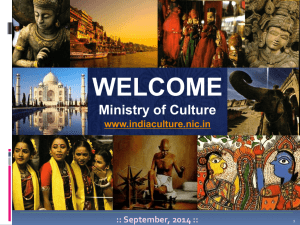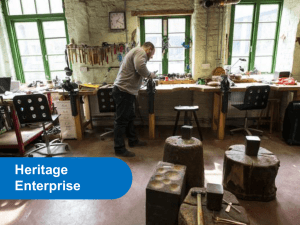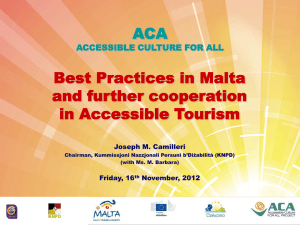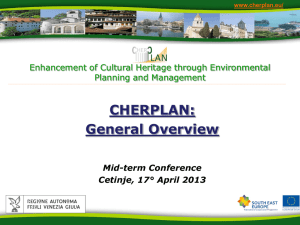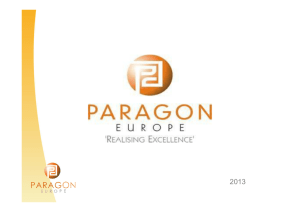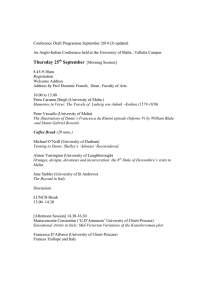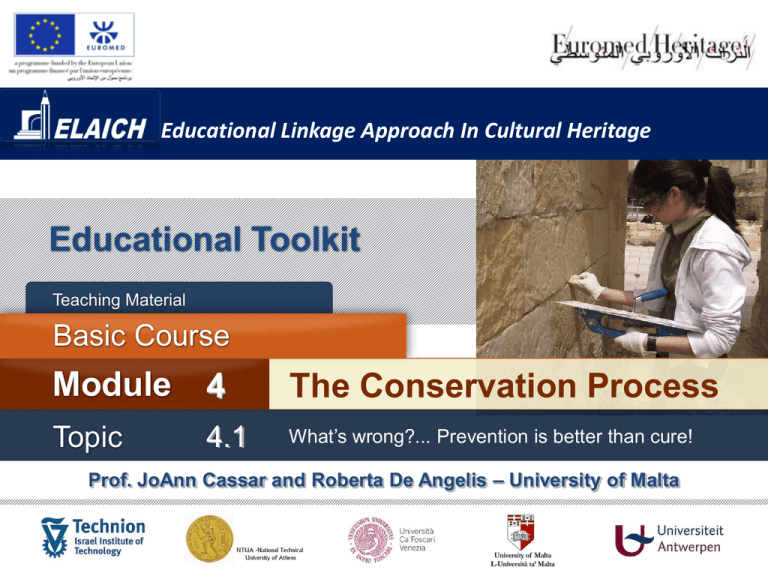
Educational Linkage Approach In Cultural Heritage
Educational Toolkit
Teaching Material
Basic Course
Module
4
The Conservation Process
Topic
4.1
What’s wrong?... Prevention is better than cure!
Prof. JoAnn Cassar and Roberta De Angelis – University of Malta
Educational Linkage Approach In Cultural Heritage
Copyright
©ELAICH Beneficiaries 2009-2012
This material is an integral part of the “ELAICH – educational toolkit” and developed as part of the project
ELAICH – Educational Linkage Approach in Cultural Heritage within the framework of EuroMed Cultural
Heritage 4 Programme under grant agreement ENPI 150583. All rights reserved to the ELAICH
Beneficiaries.
This material, in its entirety only, may be used in "fair use" only as part of the ELAICH – educational toolkit
for the educational purposes by non-profit educational establishments or in self-education, by any means
at all times and on any downloads, copies and or, adaptations, clearly indicating “©ELAICH Beneficiaries
2009-2011” and making reference to these terms.
Use of the material amounting to a distortion or mutilation of the material or is otherwise prejudicial to the
honor or reputation of ELAICH Beneficiaries 2009-2011 is forbidden.
Use of parts of the material is strictly forbidden. No part of this material may be: (1) used other than
intended (2) copied, reproduced or distributed in any physical or electronic form (3) reproduced in any
publication of any kind (4) used as part of any other teaching material in any framework; unless prior
written permission of the ELAICH Beneficiaries has been obtained.
Disclaimer
This document has been produced with the financial assistance of the European Union. The contents of
this document are the sole responsibility of the ELAICH Consortium and can under no circumstances be
regarded as reflecting the position of the European Union.
Prof. JoAnn Cassar and Roberta De Angelis – University of Malta
Educational Linkage Approach In Cultural Heritage
Abstract
Just like detectives who look for clues to solve a crime, a team of
experts (conservators, scientists, architects, art historians,
archaeologists, engineers, etc.) work together to investigate the
problems of heritage sites.
The main objective of this investigative process is to try to get to the
origin of the problem/s (i.e. the causes of deterioration), so that
this/these can be removed or at least reduced before intervening
directly on the heritage site.
Addressing the causes of deterioration before “touching”the building,
cleaning it or repairing its damage is the most efficient way of
ensuring the long-term preservation of any heritage site.
Would you clean or paint the walls of your house if rainwater is
seeping through its roof or would you first repair the roof?
Prof. JoAnn Cassar and Roberta De Angelis – University of Malta
Educational Linkage Approach In Cultural Heritage
What are the risks to our
built heritage?
Prof. JoAnn Cassar and Roberta De Angelis – University of Malta
Educational Linkage Approach In Cultural Heritage
Wall painting (1903), Malta
Does our cultural heritage have a
definite “lifetime”?
Our cultural heritage cannot last forever.
Its deterioration can be slowed down but cannot
be stopped.
Sometimes it is not...
Ħal Saflieni Hypogeum (36002500 BCE), Malta
Sometimes deterioration
is visible...
Prof. JoAnn Cassar and Roberta De Angelis – University of Malta
Educational Linkage Approach In Cultural Heritage
All materials which make up our
cultural heritage, whether
heritage sites, monuments or
objects, are deteriorating as a
result of physical, biological
and/or chemical changes that
occur over time.
Abbatija tad-Dejr , archaeological site, Malta
Deterioration
Prof. JoAnn Cassar and Roberta De Angelis – University of Malta
Educational Linkage Approach In Cultural Heritage
Threats
Jerash, Jordan
Heritage has been threatened
by
natural
causes
of
deterioration, and over the last
hundred years also by social
and economic pressures, such
as urban development, tourism
and war.
Amman, Jordan
Prof. JoAnn Cassar and Roberta De Angelis – University of Malta
Educational Linkage Approach In Cultural Heritage
Natural threats – can be slow
Prof. JoAnn Cassar and Roberta De Angelis – University of Malta
Educational Linkage Approach In Cultural Heritage
... or drastic
Prof. JoAnn Cassar and Roberta De Angelis – University of Malta
Educational Linkage Approach In Cultural Heritage
Human threats – can also be drastic
1963
2009
Bamiyan (Afghanistan) - statue of taller Buddha before (left) and after
destruction (right) by the Taliban regime in 2001.
Photo on the right is by Carl Montgomery [© CC-BY-2.0
(www.creativecommons.org/licenses/by/2.0)], via Wikimedia Commons
Prof. JoAnn Cassar and Roberta De Angelis – University of Malta
Educational Linkage Approach In Cultural Heritage
... or slow
Ħaġar Qim temple, Malta
Jerash, Jordan
Prof. JoAnn Cassar and Roberta De Angelis – University of Malta
Educational Linkage Approach In Cultural Heritage
Earthquakes, floods,
storms, fire, hurricanes,
(...)
Anything else?
Inappropriate
temperature and/or
humidity, erosion,
dissolved salts, light,
dust (...)
Thefts, vandalism, war,
urban development (...)
Anything else?
Neglect, heavy traffic
(pollution, vibrations),
tourism, inappropriate
restoration works,
ignorance, lack of
appropriate legislation
(...)
Slow and cumulative effects
Immediate and drastic effects
NATURAL CAUSES
HUMAN CAUSES
Based on de Guichen’s diagram in Youth and the Safeguard of Heritage, ICCROM, 2000: 19
Prof. JoAnn Cassar and Roberta De Angelis – University of Malta
Educational Linkage Approach In Cultural Heritage
General rule ...
Archaeological sites are usually
threatened by climatic fluctuations,
as well as man-made problems
which can include theft, vandalism,
illicit excavations, neglect and
tourism
Mnajdra Temples, Malta
Threats to historical centres
include
urban
sprawl
(including roads, parking,
modern buildings, tourism
infrastructures, etc.), incorrect
use of buildings, traffic,
pollution, tourists, all made
worse by the lack of adequate
legislation
Prof. JoAnn Cassar and Roberta De Angelis – University of Malta
Educational Linkage Approach In Cultural Heritage
Look at this building:
• What type of damage do
you see on this building?
• Which parts of the
building does it affect?
• What could be the
causes?
Prof. JoAnn Cassar and Roberta De Angelis – University of Malta


